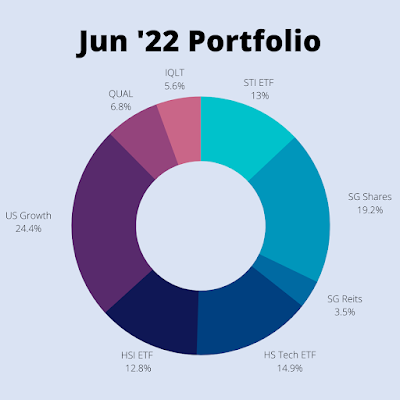Summary of
transactions for June 2022
Continued
to DCA into QUAL (avg. $121) and IQLT (avg. $33). Sold MCT as I was against the
merger with MNACT. Proceeds from the sale remain in cash as I am slightly
bearish on Reits – further explained below.
Portfolio
allocation as of June 2022
SG Shares: DBS,
SGX, Valuetronics
SG Reits:
Syfe Reit+
US Growth:
BABA, INMD, PINS, PYPL, SHOP, TDOC, TTD, UPST
On
Inflation and Recession fears
I think it
is key to understand that these two issues can be self-fulfilling.
Demand-side inflation
is driven by expected inflation, that is, if you expect prices to be
higher in a year’s time, then you would be more likely to spend now (on
non-perishables), before prices are higher in the future. Which in turn results
in actual inflation if everyone thinks and acts the same way.
Concurrently,
if employees expect inflation to be high, then they are more likely to
ask for a pay raise, which increases the cost of production for companies.
Companies, especially those with pricing power, would then mark up the prices
of goods and services, in order to pass on some of the costs to consumers. Which
potentially results in a wage-price spiral.
Taken
together, if you ask the average person on the street now, expectations of
inflation are high, and there is the danger that these expectations results in continued levels of elevated inflation.
Recessions
can also potentially be self-fulfilling.
If
households and businesses expect a recession to occur in the near
future, then the likely response would be to reign in spending now. This is
already ongoing, with many companies taking the chance to trim their workforce,
and the US Consumer Sentiment falling sharply in June. In a circular economy,
one person’s spending is another person’s income, and there would be knock on
effects when households and business reduce expenditure. This reduction in
spending and demand can result in an actual recession down the road.
View on
Reits
Real estate
is often touted as an inflation hedge as rents and asset values tend to rise in
tandem with inflation. I generally agree with this view, but I see three
potential headwinds for Reits in the near term:
1) With the
10Y Singapore Savings Bonds yielding 3%, Reits yielding 5-6% may no longer be as
attractive. Prices may have to fall further to maintain a sufficient yield
spread, to compensate investors for the additional risk of holding Reits. I am
generally bearish on Reits with high price to book values, as I believe that
Reits ultimately represent holdings in physical real estate, thus it makes
little sense to pay a huge premium over their appraised values (high P/B ratios) simply for more
“liquidity” or “diversification”.
2) For
Reits with a relatively low proportion of fixed rate debt, the rising cost of
borrowing would hit them hard. While the majority of Reits have fixed or hedged the bulk of their borrowing costs to somewhat mitigate the impact of
rising rates, there would be a direct impact on future acquisitions and refinancing. If we look at the property level, especially in the Singapore
office/retail sector, rates rising beyond 3% would mean that financing of most
SG Office assets would not be feasible. For example, if a Grade A office asset is
valued at a cap rate of ~3% (NPI yield of 3%), then it would make little sense
to finance part of the acquisition with debt as it would be a net negative on
cash flows.
3) The
effect of this is harder to quantify, but a favoured strategy for some Reit
investors would be to purchase Reits on margin. When margin rates were at 1-2%,
it made sense take leverage and purchase Reits that were yielding 5-6% and
profit from the spread. With rising interest rates, it makes this strategy less
lucrative, and leveraged investors would potentially have to deleverage.
That’s all
for this month’s update – for my monthly portfolio summary, please follow my Instagram
Page @alpacainvestments

